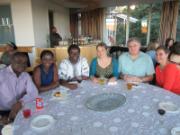
In February, the Department of English Language and Linguistics hosted Jeremiah Nwankwegu, an African Humanities Project Fellow-in-Residence from Ebonyi State University in Nigeria. Nwankwegu is finishing his PhD thesis, investigating the syntax of interrogatives (question sentences) in different dialects of Igbo, a language spoken in Nigeria. He presented his work at a Linguistics Departmental Research Seminar on Tuesday 24 February.
Nwankwegu described how interrogatives are structured differently in different dialects of Igbo, and explained these differences using the framework of Minimalist Syntax. Different languages of the world have different ways of handling question sentences: some languages like English move the wh-word (such as ‘who’, ‘what’ or ‘why’) to the beginning of the sentence, while others like isiXhosa keep these words in the parts of the sentence where there is a gap in the information, leading to constructions like “John did what yesterday?” instead of “What did John do yesterday?” In general, Igbo is said to lie somewhere in between these two types of languages, with an option either to move the wh-word to the front or keep it in place. Nwankwegu argued that Igbo in fact never moves its wh-words to the front of the sentence in the same way that English does, but rather uses a process called ‘Pseudo-Wh-Fronting’. This means that when the wh-word appears at the front of a sentence, the sentence is in fact a shortened version of a construction such as “It is what that John did yesterday?” He also showed that one of the question constructions, which employs the wh-word kedu, uses different rules from the other wh-constructions in forming wh-questions.
